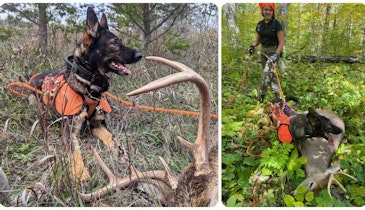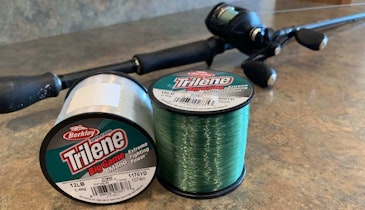By JEREMIAH SHELOR | The Exponent Telegram
PHILIPPI, W.Va. (AP) — According to Kathy Rose, it was on a buck hunt that her husband John first got the idea for their deer farm.
That day John Rose bagged a buck so big, it was the stuff of legend.
"People were coming to see it for miles," Kathy Rose said.
Kathy Rose has the buck mounted on the wall of her log cabin, which sits overlooking her Philippi farm. Seeing the buck there, with its strong neck and coal-black eyes, it's easy to picture how John Rose might've felt inspired when he encountered the creature in the wild.
An avid hunter, John Rose had met nearly every challenge the sport has to offer. But after this particular hunting trip, he thought up a new challenge of a very different sort.
He knew how to hunt deer. Now he would try to nurture them.
"That was a challenge, just to see how big a buck he could raise," Kathy Rose said. "People thought he was crazy."
John and Kathy Rose started raising deer in 2004, building several pens with 10-foot-tall fencing on their 100-acre property. The farm now boasts 39 white-tailed deer and five elk.
On a recent afternoon, Kathy Rose called out to each of her deer by name as she brought them their daily meal of apple slices and corn. One doe that had been lying in the grass got up and stretched at the sound of her voice.
Kathy Rose said the deer on her farm are completely tame; they have never lived in the wild, nor will they. Still, deer are cautious creatures by nature and wary of strangers.
But to these deer, Kathy Rose was clearly no stranger. One buck even inched close enough to nip an apple slice from her hand.
Kathy Rose said she wasn't always so involved in the farm and that she gradually took on more of the day-to-day responsibilities.
"(John) got me hooked by asking me to bottle feed fawns," she said. "Who's going to say no looking at those little fawns?"
Now Kathy Rose does everything. Her husband passed away on Oct. 30, 2012, after he was struck by a fallen tree limb during the snowstorm caused by Hurricane Sandy.
They were out on the ATV feeding the elk. When their vehicle got stuck in the snow, John Rose told his wife to walk ahead without him.
"'Just walk to the top of the hill.' That was the last thing he said to me. 'Walk to the top of the hill,'" Kathy Rose said.
After waiting for him to pick her up, Kathy Rose walked back to find her husband's body.
Though she now has to run the farm by herself, Kathy Rose said she has no interest in selling or giving up.
"I'm trying to keep the farm going, because it was his dream," she said. "I want to see it through and see what happens."
But regulatory obstacles currently stand in the way of Kathy Rose and other deer farms in the state of West Virginia.
Currently, deer farms fall under the jurisdiction of the state's Division of Natural Resources. This means deer farms have different restrictions, deer farmers can't sell their venison, for example, compared to farms raising more traditional livestock.
Walt Helmick, the commissioner of West Virginia's Department of Agriculture, said he wants to see deer farms regulated in a manner similar to other forms of agriculture.
"We want to monitor and promote that industry through the Department of Agriculture," Helmick said. "We feel that we can create a significant number of jobs, that we can do something that fits the tradition of West Virginia."
Helmick pointed to Pennsylvania's deer farming industry as an example. Pennsylvania, he said, has around 1,000 deer farms, making $75-85 million annually.
West Virginia, he said, has about 35 deer farms.
"We take that number, 35, and look at the possibility of growing it, but we have to be able to promote the product. We have to be able to sell venison, which we cannot now do," Helmick said.
Helmick said he has confidence that a resolution to place deer farms under the oversight of the Department of Agriculture, which he said will go to the state Legislature in January, will bring some closure to a much debated issue.
"I think this is the year for it to pass," Helmick said. "I think we have the votes."
In the meantime, Kathy Rose will continue caring for her deer, optimistic for the future.
She set up a memorial fund in her husband's name, which she hopes will raise money to help educate others about the potential for the deer farming industry to grow in the region and in the state.
As an alternative livestock, Kathy Rose said, deer offer a unique opportunity for West Virginia landowners.
"You can take unclaimed land that you can't do anything with and put a deer pen on it," she said. "Anything traditional livestock couldn't exist on, a deer can."
Kathy Rose said that, before his death, her husband lobbied aggressively for the expansion of deer farming in West Virginia.
And even though it's clear she would rather name fawns than argue for legislation, it seems that in her husband's absence, Kathy Rose will continue to champion his cause.
A point John Rose made often: There are restaurants in the state that sell venison, only it's imported from outside West Virginia.
"Why can't we tap into that?" Kathy Rose said. "We've got the resources right here."
———
Information from: The Exponent Telegram, www.cpubco.com






